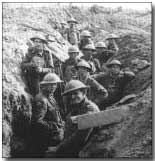Between 1869 and 1939, more than 100,000 children immigrated to Canada from England, Scotland, Ireland and Wales. More than 10,000 of them enlisted for Canada during WWI. That was almost all of legal age and a few that fibbed.
Charles Reaper, a boy who immigrated through Quarriers of Scotland, was Vimy Ridge’s last remaining infantry man. He died in March, 2003.
At twelve, Charles, a Glasgow orphan, arrived in Canada on April 8, 1912. Four years later, he lied about his age and joined the military. "It was," he said, "the only lie I ever told."
At Easter, 1917, before he turned eighteen, Private Charles Reaper was one of 20,000 Canadian soldiers who formed the "creeping artillery barrage" that took Vimy Ridge.
Decades later, when Charles was interviewed about his Vimy Ridge experience, tears filled his eyes as he recalled the battle that took the lives of hundreds of his fellow soldiers. As his comrades fell around him, there was nothing to do, he said, but to keep moving forward with his unit, over the Douai Plain. Charles was hit by shrapnel. He counted himself
fortunate; 3600 died during that hard-won battle.
Charles spoke little of his war experiences, not even to his wife, but when he did, he always added, "What kept me alive was the man above.” Charles recovered from his Vimy Ridge wounds and by the Fall of 1917, he was entrenched in the third battle of Ypres, on Flanders Fields.
 In trenches filled with mud, his uniform soaked, his body chilled, he survived mustard-gas attacks by pressing underwear soaked in urine over his mouth and nose. Canadian troops prevailed and overtook at Passchendaele, a Belgian village, but not without heavy losses, on both sides - 500,000 soldiers died in that epic battle.
In trenches filled with mud, his uniform soaked, his body chilled, he survived mustard-gas attacks by pressing underwear soaked in urine over his mouth and nose. Canadian troops prevailed and overtook at Passchendaele, a Belgian village, but not without heavy losses, on both sides - 500,000 soldiers died in that epic battle.
Charles was wounded and sent to a hospital in England for a long recovery. "Because of my accent, they called me an Old Country kid in the hospital," he recalled. "But I said, `No, I'm a Canadian.' "
Though he’d been in Canada only four years, Charles developed a strong sense of devotion to his new country. At the end of the war, he settled in Winnipeg where he worked as a transit supervisor and driver for forty-eight years. After the war, Charles met and married Anna, whom he was married to for sixty-nine years. She said of her husband, “Charles hasn’t talked much about his war experiences, but he has always believed that serving his country was his duty and a glorious moment in his life.”
Charles and Anna had no children but were close to many nieces and nephews. A month shy of the 86th anniversary of the battle at Ypres, Charles Reaper, age 103, died in Winnipeg on March 1, 2003. Charles’ obituary read:
CHARLES REAPER Peacefully at the Riverview Health Centre, on March 1, 2003, Charles Reaper passed away into the arms of the Lord. Left to mourn are his dearly beloved and dedicated wife Anna; his nephew Darren Stirling (Debbie) and Janice Gill (Don) who were always there for him with endless love and kindness. Also many loving family members including numerous nieces and nephews. Charles was born on July 27, 1899 in Keith, Banffshire, Scotland. Charles Reaper, who died in Winnipeg a week ago today, aged 103, was the last of the 20,000 young Canadians who "went over the top" at dawn on April 9, 1917 to attack Vimy Ridge, and by lunchtime had given the young nation its first grip on a fragile national identity.
Promises of Home - Stories of Canada's British Home Children by Rose McCormick Bandon is a collection of 31 stories of destitute children who immigrated to Canada and worked as indentured servants until age eighteen. Their coming helped to make our country great. Promises of Home, both the book and blog, seeks to give these children the honour they deserve. To purchase the book, visit http://writingfromtheheart.webs.com.










.jpg)








